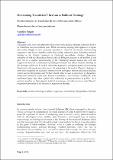Overcoming ‘Gnosticism’? Realism as political theology
Abstract
This paper takes issue with approaches that relate realist political theology exclusively back to its Schmittian and neo-orthodox roots. While not entirely denying those influences, it argues that realist thought is more accurately described as rooted in the tensions characterizing Augustine's anti-heretic diatribes rather than taking inspiration from Schmittian political theology or the ‘Gnostic’ tendencies in Protestant neo-orthodox theology. Augustine's refutation of both the Manichaean Gnostic and the Pelagian solutions to the problem of evil gave rise to a complex understanding of the relationship between human free will and original sin based on a combination of ontological monism and ethical dualism. Building on this heritage, realists can be read as rehearsing Augustine's ambiguous gesture of overcoming Gnosticism with equally uncertain success. In responding to the modern ‘Gnostic’ challenge in terms that recognized the dialectical tension between ontological monism and ethical dualism, realists such as Morgenthau and Niebuhr should rather be seen as direct heirs of Augustine's ambivalent orthodoxy rather than Schmitt's unorthodox, semi-‘Gnostic’ Catholicism. This intellectual legacy may, then, explain their abhorrence of purist positions in politics—be they quietism, pacifism or, their opposite, political messianism—and adherence to an anti-‘Gnostic’ pragmatism grounded in the tensions of Augustinian theology.
Citation
Paipais , V 2016 , ' Overcoming ‘Gnosticism’? Realism as political theology ' , Cambridge Review of International Affairs , vol. 29 , no. 4 , pp. 1603-1623 . https://doi.org/10.1080/09557571.2014.978265
Publication
Cambridge Review of International Affairs
Status
Peer reviewed
ISSN
0955-7571Type
Journal article
Collections
Items in the St Andrews Research Repository are protected by copyright, with all rights reserved, unless otherwise indicated.

